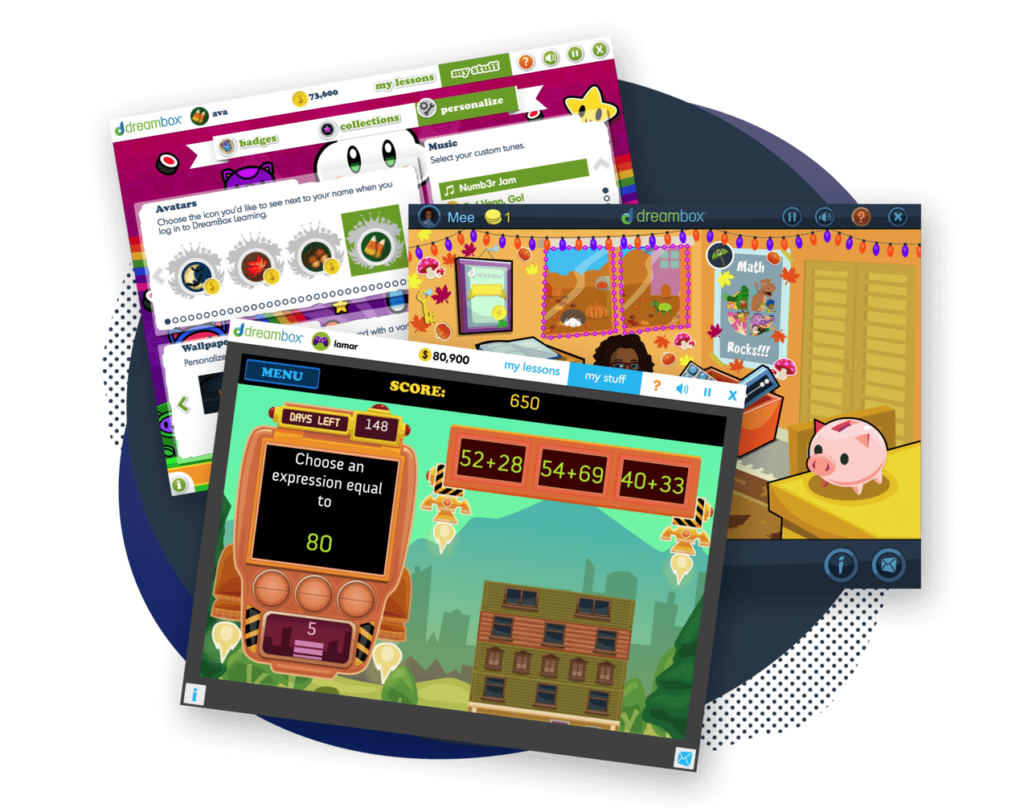How To Learn Math: 12 Tips and Strategies for 2024
With some creativity and a few helpful tools, learning math is easier than ever.

Author
Jill Padfield
Published:
Oct 2024

Key takeaways
- Know what you need – Before you can learn, you need to know what you don’t know.
- Set measurable goals – Track your progress as you learn, and let the pride you get for meeting goals carry you through the next lesson.
- Get some help – Either through online tutors or in-person study groups, you don’t have to learn alone.
If you find yourself struggling with algebra or ready to tear your own hair out over the unit circle, you are not alone. Math is one of the most challenging subjects, and the difficulty puts many people off the subject entirely. Fortunately, now more than ever, you have tons of strategies and tools at your disposal to make learning math much easier and effective.
Whether by playing math games online for review or by enlisting the help of study groups and tutors, you are not alone in your journey through the challenges of math. Below, you will find the many ways you can make learning math less imposing and even fun and rewarding.
1. Identify your strengths and weaknesses
One of the things people struggle with the most when trying to study is figuring out where to start. This is why taking a beat to figure out your personal math strengths and weaknesses is so important. Once you know where you stand, you can figure out a plan.
Strengths let you know which skills you are comfortable with, and those skills might overlap with areas where you struggle, giving you a stronger foundation to learn difficult topics. Weaknesses are where you need to improve the most, and these can be illuminating, too. You can look for patterns in where you struggle and target the skills they have in common as an area for remediation.
Assessments you take in school, online quizzes, and general knowledge tests you find in study books are all solid ways to begin identifying your strengths and weaknesses. You can also talk directly to teachers and tutors to figure out what they have observed.
No matter how you figure it out, just make sure you take the time to discover strengths and weaknesses. Directionless studying is usually fruitless and frustrating.
Table of contents
Turn math into playtime with DreamBox Math
DREAMBOX MATH
Get started for FREE today!

2. Set personal learning goals
Once you have a clear sense of where you need to improve, set specific, measurable goals for yourself. Goals are necessary for motivation and for helping you track progress. Without them, your study sessions lack direction and any meaningful way to determine how well you are doing.
However, not just any goal will do. Simply trying to “get better at math” will leave you annoyed and unsatisfied with any growth you do make. Your goals should be measurable benchmarks rather than vague hopes. You may want to hit a particular score on a quiz or complete a certain number of lessons by a specific date.
Just make sure the goals are realistic, though. Look at how you have done in the past and strive to do slightly better next time. Steady, incremental progress is better than unsustainable sprints to excellence.
3. Find a syllabus that fits your goals
You don’t have to reinvent the wheel when you’re trying to target specific skills or challenges in math. Depending on what you need to work on, you’ll likely find plenty of pre-made syllabi or study guides tailored toward specific topics, skills, and goals.
The teachers and professionals who design these guides usually know the best order of topics to learn in order to develop skills that build on one another into more and more complex topics. Without this guidance, you might jump too far ahead and become overwhelmed by a topic you don’t have the prerequisite skills for.
4. Create your own study guides
Once you have more experience with math and have a better understanding of what you need specifically, you can branch out into creating your own study guides that are incredibly personalized and focused on individual goals. You can, of course, use existing guides and syllabi as a blueprint for your own study plan, but that is just the start.
If you know that you are comfortable with certain topics or skills, you might be able to skip over those or do an abridged bit of practice with them. Areas that you know you struggle with will naturally need more time, so you can adjust your guide accordingly. Developing a plan like this for yourself develops agency, which is a vital part of growing up and developing individuality.
5. Apply real-life situations
Our brains like to compartmentalize things. We sort information based on the context we got it in, and this can make retaining information more difficult. For example, have you ever gotten up and walked into the kitchen for something only to immediately forget why you went to that room in the first place?
This Doorway Effect illustrates how easily our mind can dump information when the environment or context changes, which explains why it is so easy to forget math knowledge after you are done with the lessons for the day.
To combat this, you need to be able to see where math is relevant in all sorts of contexts, and that is where applying math to real-life situations comes into play. The more connections you can make between your daily life and the math you are learning, the more likely you are to remember those topics.
Actively try to see math in the world around you. Do simple calculations by hand before you resort to a calculator. Think about the physics and geometry involved in designing the skyscraper you’re looking up at. Complete math puzzles and games when you’re trying to kill some time. Making math part of your day-to-day routine will keep those skills present and valuable.
6. Use visualization to understand math
A lot of math, especially as you get into more challenging topics, deals with abstract concepts. These ideas are harder to grasp because they don’t easily translate into images you are used to dealing with in real life.
However, you can make an effort to visualize what you can to make the math concepts you are trying to learn feel more concrete. Visualization makes math easier to grasp by appealing to how we see the world normally.
Basic arithmetic is the simplest to visualize since you are mainly moving around quantities. When tackling 4 + 6, you can easily imagine 4 apples and 6 apples combined together to equal 10 apples.
You can also grab physical objects like M&Ms or Cheerios to manually do the adding, subtracting, multiplying, and dividing. More complex math can benefit from sketching out word problems or using graphs to represent equations and functions. If a word problem wants you to calculate the length of a shadow based on the angle of the sun, draw it out.
Trying to hold all that info in your head at one time will just make you frustrated.
7. Embrace your mistakes
No matter how good at math anyone is, they will inevitably make mistakes. Instead of letting these errors anger or discourage you, use them as learning opportunities. If you consistently make similar mistakes, make a note of where you goof up.
This could be an area of later studying or a skill to get a little extra help with in class or with a tutor.
Embracing the mistakes also makes overcoming them all the more rewarding. Since you actively acknowledge that a certain topic or skill is a problem for you, mastering that skill later will feel much better because you accomplished a goal. You made a targeted effort, and you did it.
8. Make use of technology
Now more than ever, you have access to an almost overwhelming number of online aids and tools to make learning math easy and fun. Virtual learning games like DreamBox Math adapt to your learning preferences and needs, granting you an unparalleled level of personalization to make learning math as smooth as possible.
These sorts of apps and websites use your assessment data to curate additional practices and lessons that are unique to your needs, taking away a lot of the guesswork that comes with studying on your own.
You’ll also find plenty of entertaining math games online that apply math skills creatively to exciting and competitive activities which are much more engaging than traditional worksheets. When you make practicing math fun, you are much more likely to keep up a solid studying routine.
9. Practice regularly
Math, as with most skills, is a “use it or lose it” situation. If you go too long without thinking about a certain skill or practicing with it, your brain is likely to assume that info is no longer relevant and flush it away.
Practicing regularly is necessary to keep those skills sharp and present. Math concepts are typically cumulative, meaning that you will need old skills to learn new ones. That means that if you forget something because you stopped practicing with it, you’re going to have to do a lot of relearning when you need to tackle a new math concept with that forgotten skill as a prerequisite.
10. Follow a study schedule
To make regular practice easier, set up a consistent and feasible study schedule. Consistent means that you dedicate time during several days of the week to practice math skills. Fight the urge to put off scheduled sessions because of feeling tired or for other arbitrary reasons. Skipping too many opportunities to practice will establish the wrong habit and make getting back to studying much harder.
A feasible routine will help prevent dropping off of a study schedule. Look at the time you have available and how long you can stay focused, and build your sessions around that. If all you can offer is 15 minutes every other night for math practice, that is much better than nothing. As your focus improves, you might be able to do longer or more frequent sessions as needed. The important thing is to get into a healthy routine and establish studying as one of your good habits.
11. Join a study group
Some supportive peers can go a long way in helping you stick to learning math. Not only do peers help you stay focused and motivated, but they can also offer new insights and perspectives on topics. By sharing ideas and individual approaches to math problems, peers help one another learn.
You can find study groups in schools, online, or through local tutoring programs hosted by libraries or tutoring organizations. These study groups are also a great place to make friends and happy memories, and the more positive emotions you can link to math, the more likely you are to remember it and keep studying.
12. Get help from a tutor
Sometimes a more one-on-one approach is necessary. Private tutors come in all shapes and sizes, both in-person and virtual. Online tutoring is highly convenient and flexible. Some online services offer 24/7 support and allow for either regular, scheduled meetings or quick, drop-in style chats for quick questions. These virtual options can often be more affordable, too.
In-person tutoring, while less convenient, does offer a more intimate, personal tutoring experience for those who need more of a physical presence. Meeting a tutor face-to-face also removes the usual hiccups that come with technology like internet slowdowns and crashing computers.
FAQs about learning math
Everyone develops at different paces, and some more abstract math concepts are more challenging until you reach certain developmental milestones. If you are struggling with math, you may also be missing prerequisite skills. Consider revisiting previous concepts and reenforcing those skills. The problem with a current math lesson may lie with a topic you thought you were finished with.
Depending on the math topic you are studying, the speed at which you can study will change dramatically. Flash cards can be good for multiplication tables, but complex algebraic functions are not so easily studied. Math games, however, can make the time you spend studying pass by much quicker thanks to the level of fun and engagement they can offer.
Learning math on your own can be challenging, but with a specific plan in place, plenty of resources on hand, and a bit of determination, you should be able to learn the basics. For more complex topics, a dedicated tutor may be necessary for you to work out the nuances.
Starting young with basic arithmetic is ideal. Toddlers from ages 2 to 4 can begin to understand numbers and counting, and from there, you can start adding on addition, subtraction, multiplication, and division throughout elementary years. For abstract topics, once students begin to enter puberty, their minds are prepared for algebra, but some are ready at earlier ages.
Take at home math practice to the next level
Empowering parents and educators to make math practice more impactful. Plus, your kids will love it.


